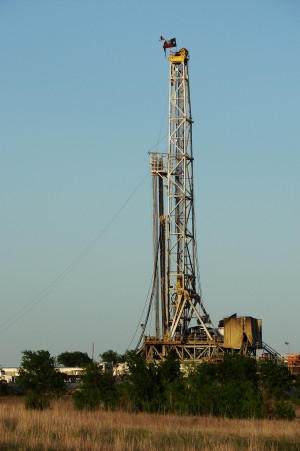What’s With All These Earthquakes in Texas?
Call it a new Texas tradition: An earthquake hits and the ground has barely stopped shaking before people start looking for oil and gas drilling operations near the quake zone.
This past week saw a big jump in rare seismic activity across the state. Last Thursday, a 4.6 magnitude earthquake startled San Antonio residents early in the morning. And this Sunday, a 2.1 magnitude quake shook Keene, a small town just 25 miles south of Fort Worth. Then, early this morning, the U.S. Geological Survey says a 2.6 magnitude quake hit near Fort Worth.
All those places are relatively close to drilling operations and disposal wells.
Zac Trahan, the Program Director for the Dallas-Fort Worth office of Texas Campaign for the Environment (TEC), pointed a finger in that familiar direction. He believes that the disposal wells for hydraulic fracturing operations may be behind the increase in earthquakes outside of Dallas-Fort Worth.
“North Texas historically has not had a lot of earthquakes and seismic activity,” Trahan said in an interview with StateImpact Texas.
But as the region has experienced a boom in natural gas drilling and an accompanying increase in the disposal wells used to store drilling by-product, “we’ve seen earthquakes increasing in this region in the past few years,” Trahan said.
The numbers back that up. In recent years, the Dallas-Fort Worth area has expanded hydro-fracking operations in the Barnett Shale. Since 2010, the area has witnessed at least ten minor earthquakes.
But the two earthquakes this past weekend also illustrate the difficulties in determining a cause-and-effect relationship between disposal wells and quakes.“The situation south of San Antonio is more complicated than the one south of Dallas,” said Dr. Cliff Frohlich, the Associate Director of the Institute for Geophysics at the University of Texas at Austin.
The reason? Oil and gas operations, spurred by fracking technology, only recently began around the Dallas area. Frolich said that makes a correlation between quakes and fossil fuel development easier to spot.
On the other hand San Antonio has been developing the Eagle Ford since the 1950s, and there’s been earthquakes in that area since the 1970s.
“Now, they are doing additional hydraulic fracturing and disposal and there’s earthquakes. So, it’s hard to say whether these are related to the same old, same old business or something new,” said Frohlich.
And, for Frohlich, this past week’s seismic fits might not be related to hydro-fracking disposal wells at all.
“You can’t draw a perfect link. One thing, it’s very difficult to know exactly where the earthquake occurred. When the U.S. Geological Survey reports an earthquake it can be mislocated by five miles or even more. So, we really don’t know where the earthquake was with respect to wells,” said Frohlich.
Nevertheless, there is growing evidence linking quakes to drilling disposal wells.
A recent study requested by the Department of Energy (DOE) and conducted by the National Research Council (NRC) indicates that long-term disposal wells can be linked to increased seismic activity.
In fact, the debate appears to have moved from whether drilling operations cause earthquakes to how dangerous those earthquakes might be.
The NRC study suggests that wastewater disposal wells used in the hydro-fracking process don’t pose as great of a risk of causing earthquakes as traditional disposal wells. Unlike other disposal processes, hydro-fracking wastewater disposal often occurs at low pressure, reducing the likelihood of affecting nearby faults to create an earthquake.
And even if wastewater disposal does induce earthquakes, Dr. Frohlich maintains that we haven’t seen anything too alarming.
“The earthquake Sunday was around a 3.6 [outside of San Antonio]. That’s still a pretty small earthquake. A 3.6 shakes things, maybe chandeliers swing and something falls off your shelf if you’re really close,” said Frohlich.
But a ProPublica report published Monday, indicates that operators don’t always follow proper protocol when injecting wastewater. They inject the water back into the earth at pressures beyond suitable levels, the report found. This can agitate fault lines just enough to generate noticeable earthquakes. The report also shows how toxic liquid can leak out of disposal wells.
All of this information will likely be the subject of debate before the House Committee on Energy Resources today. The Committee is meeting to discuss state regulations governing oil and gas well construction and pipeline safety, as well as the process by which oil and gas operators submit well logs. You can watch that hearing by clicking here.
Sheyda Aboii is an intern with StateImpact Texas.




